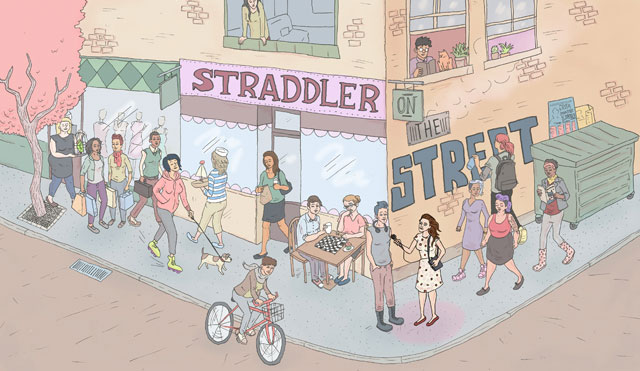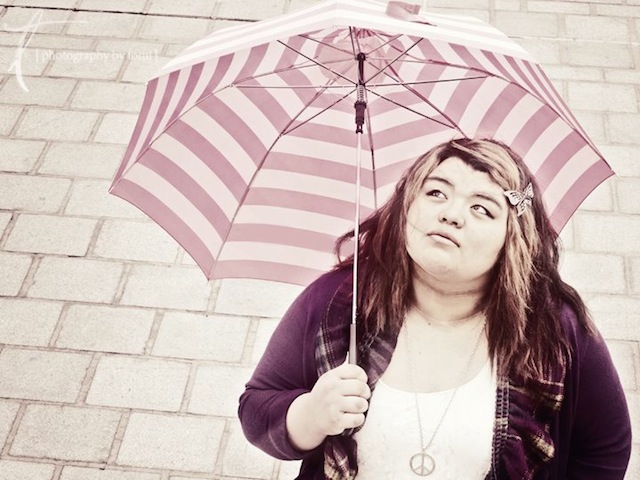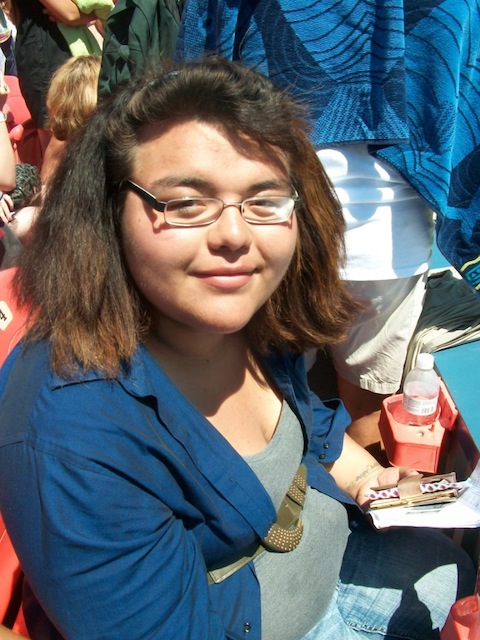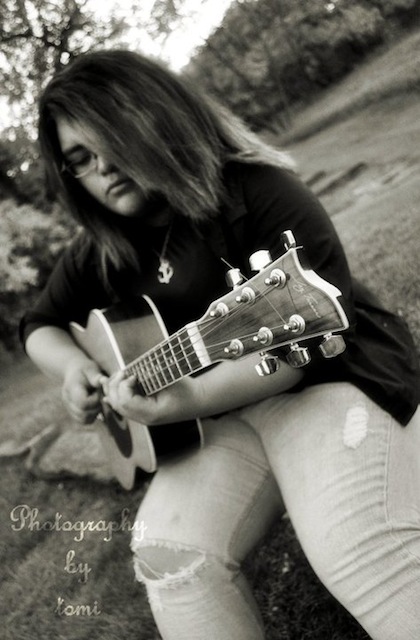Hi crush monsters, this is Straddler On The Street, a feature where I celebrate all of you incredible Autostraddle readers by hunting you down, demanding you chat with me, and then writing about you on the Internet so we can all crush on you. Get excited, because butterflies in your stomach 24/7 is a fantastic way to live.
Header by Rory Midhani

Straddler On The Street: Charli, 20
Charli emailed me a few weeks ago and introduced herself as a “fat, body positive, queer/pansexual Native American girl from North Dakota” currently studying at Dartmouth College, and told me she’d be a great Straddler to interview for this column because she’s “part of a terribly underrepresented minority.” Of course she was right, so I emailed her that very same day and here we are now.
She grew up on in poverty on Standing Rock Reservation, and says she worked her “a** off” to get into her dream school. She’s a musician and you can listen to her solo music here or here; she’s also working on an EP with her friend and it will eventually be available here. Charli is really rad and taught me about a lot of stuff I didn’t know over the course of our two hour interview. I bet she’ll teach you something new, too.

Charli, 20
You’re at Dartmouth now, right?
Yes, though I won’t be going back East until January.
Oh, how come?
I’m on medical leave right now… January is the point I chose to return since that’s when the next term begins.
Do you mind if I ask about your medical leave? Are you okay?
Oh, I don’t mind at all! It’s basically leave so that I can work on my mental health. And I’m totally okay, taking time off to deal with it was incredibly helpful and productive.
That is excellent! Can you expand a bit on what you mean when you say work on your mental health? A lot of people in our community struggle with this but it’s still not spoken about very much or very openly.
Certainly! I can’t stand the stigma around mental health conditions and trying to get help for them. I have depression and anxiety, both of which can be pretty severe at times, and also deal with effects from traumatic experiences in my past. Coming home to ‘work on it’ basically meant getting therapy I never got as a child and teenager, learning mechanisms that would prevent me from ‘shutting down’ as I often did, and coming to terms with the struggle that is depression. It sounds silly, but I even had to make myself learn to make phone calls and approach people I am not familiar with, because my anxiety (namely, social) prevented me from doing so for so long. This (the interview) is kind of a big deal for me!

thank you so much for talking to me, seriously charli. i’m so glad you did.
Well thank you so much for talking to me, seriously. And I don’t think that sounds silly – I think it’s awesome that you are doing the work. Do you like living in North Dakota?
Oof, my relationship with North Dakota – and my reservation – is really complicated. On one hand, I’ll always love this place as my hometown, and Standing Rock will always be my home, but it’s hard to be a queer lady here, especially a Native queer lady when I’m off-reservation. It’s a pretty conservative place, North Dakota, and it can be a little intimidating at times.
What is it like living on a reservation?
The reservation is really special and dear to me, but I always always saw it as both a blessing and an obstacle because it is my home, but it’s also not a place for an artist to grow, and I thrive on art, namely music. It’s hard to deal with watching people become addicts, just to give you an example of how I grew up. I don’t know how many family members I’ve seen die or become terribly ill because of alcohol or drugs, and I know it strikes fear in children at a young age. At the same time, though, this place is FULL of potential, and watching those addicts overcome their addictions and maintain sobriety? That’s inspiring. A lot of my inspiration for my music or my writing comes from watching people persevere under those conditions, so I think the reservation raises fighters, which is pretty cool.
To be honest I don’t know very much about what it’s like to live on a reservation. Is addiction common?
Oh, addiction is very, very common. I don’t want to make it sound like that’s all the reservation is, because it’s not, and all reservations are different. The truth is, though, that alcoholism has been a problem since colonists introduced alcohol to Natives, and it still is a rough condition here. With drugs, they come and go in trends, but it gets worse and worse. Right now, meth is starting to get really bad here, and it’s heartbreaking. You see people getting thinner and thinner, but not in healthy or good ways. My people work really hard to combat this with positive programs and encouraging healthy living, but it’s still a very big problem.
How common is it to leave the reservation?
It’s not as uncommon as you would think to leave the reservation, but it’s pretty uncommon, where I am from, to leave the state for college, or for anything except the military. It’s different for other reservations, I know; there are places where it’s no big deal at all to leave the ‘rez’, but out of my graduating class, four of us left the state after high school, and only two of us left for college – the other two went into the military. Fun fact, we were all girls! But yeah, it’s fairly common to leave the reservation, but not common to go far from home.
Did you always know you wanted to leave?
Yes, I did. It wasn’t that I didn’t love my home; I just always wanted to go places and see things. When I was… six, I told everyone I was going to move to New York City, and from the time I was in fifth grade, I wanted to go to NYU – which I eventually changed my mind about, obviously.
Is it acceptable to be a queer woman on your reservation?
Being a queer woman on the reservation is a little complicated. It’s sort of a gamble to know how people will react. There are a ton of people who are really supportive and great allies, but you can come across an equal amount of ignorant and offensive people. The hardest thing, for me, was the fear of my family reacting badly, because family is so important to most Native people. For the most part, yes, it is pretty acceptable to be a queer woman on the reservation, but that doesn’t necessarily mean people grasp sexualities outside of the L and the G.
I think that is true for a lot of the world! How big is your reservation?
I think the last census said around 8,000 people? That’s about 8 towns combined, though. The town I grew up in had about 200 people. My high school was actually for the whole reservation, and they sent buses out to all the towns to bring them to the reservation headquarters, where the high school is.
Got it. Can you tell me a bit about your art and music? Is that what you’re studying at school now?
Well, I’m studying English, but not music, so I guess I’m studying some of that art. I write mostly short stories, so that’s that part of my artistic outlet. I’ve been singing since I could talk, and I started seriously writing songs when I was about fourteen. My music is probably something boring like easy listening or something, but in my band Humor the Ruse, we write ska-type stuff, and my band at Dartmouth, Dakota Wells, does acoustic/folk music. I also get to do a lot of much at Dartmouth with my a capella group, The Rockapellas.
I’m obsessed with a capella! When you think of the future, do you hope to pursue your art(s) in a professional sense?
So am I, since joining them! I’ve always wanted to perform, really. I hope to sing professionally; that’s the ultimate dream. If I couldn’t do that, I would be happy with teaching and writing historical fiction, because those are also things I get joy from. The world is still wide open, though, so I might find something totally different that I want to do.

check charli out!
That sounds amazing. I am currently trying to figure out what to do in this world, so I appreciate the idea of it being wide open.
That’s one of those life lessons that I hold onto the hardest. High school always makes life seem so black and white when there are so many opportunities.
That’s definitely true. You described yourself to me as fat and also as very body positive – can you talk about what those identities mean to you?
So, body positivity is something that I consider, like, the most important discovery I ever made. I have always been fat, or at least chubby, and it was the source of a lot of bullying and heartache, so I always associated my body with bad things; I thought of my body as a ‘bad thing’. Through tumblr I discovered this ‘body positive’ movement, and it sort of changed everything about how I see the world and how I walk through it. With girls like Amber Riley and Rebel Wilson and Melissa McCarthy being beautiful and fat and funny, and watching these other girls show off their bodies as beautiful spaces in the universe, no matter how big or small they are, made me take huge steps toward loving myself. I learned that I didn’t really want to be thin, and that all I really needed my body to be able to do was sing and dance, and if I could do those things well enough, then there’s no reason to beat myself up about it, because I’m not an unhealthy person, despite what my size says to strangers.
Does your body positivity intersect with your sexuality?
I am undoubtedly pansexual, and I’ve always loved what that says about loving all genders. I’ve always been the kind of person who’s never had any sort of connection between physical attractiveness and attraction. I’ve never been one to think of anyone as ugly physically, because I just really don’t see people that way and to me, that connects not being restricted by gender – or lack thereof, in the case of agender folks – when being attracted to someone. Pansexuality, to me, helps reinforce my philosophy that everyone is beautiful and sexy and glamorous in their own way. Not to say that a lesbian or an asexual person couldn’t feel that way! Pansexuality has just been something that fit perfectly into my worldview.
I love all of that – what a great way to define pansexuality! You mentioned some inspiring fat ladies – who are some other inspirational figures in your life?
Oh goodness, where to start! Amber Riley is my celebrity crush AND a huge inspiration to me in terms of body positivity. I’m also totally in love with Keira Knightley, as strange as that sounds, and I have been since I was like ten. I have a bit of a brain crush on Maureen Johnson.
Understandable! At the beginning of the interview you mentioned that you were nervous to tell your family about your queerness at first. Did you ever struggle with being Native American and queer, or did those identities always fit together for you?
You know, in a historical sense, they fit perfectly fine. The Dakota (which I am) people have a history of accepting and praising two-spirited people, which is more of a gender-identity more than a sexual identity, but it was still queer to me, and I still fit in with that, in my mind. It was more of a modern thing that terrified me. Like I said before, it’s hit-or-miss with people on my reservation, and that included people in my family, despite having many queer family members (not close ones, but still family nonetheless). It wasn’t until I talked to one of my other queer Native friends, Autumn (another Dartmouth girl), who is totally dedicated to our culture, that I realized how easily I could grow in both aspects, as both a queer woman and a Native woman. So to answer you, no, those identities didn’t always truly fit together, but I feel like they do now.
You mentioned in your initial email to me that you have an intimate view of “the complications between culture and sexuality.” What do you mean by that?
I’m someone who is pretty exposed to my culture. Not all Native kids can say that, surprisingly, but I’ve always been exposed to traditions and the language (which I am learning now, actually), but not necessarily in all ways. For example, stuff about gender and sexuality? I didn’t learn about that growing up, even though my own culture has strong histories concerning those. I had to go learn about those things myself, but when I did, it enriched my cultural understanding of the world and the way we go through it, yet it also made me realize how much Native people have changed since colonization. For example, Dakota/Lakota people don’t talk much about any genders outside the binary anymore, and we’ve also become totally engrossed in the ugly practice of suppressing female sexuality. Both of those practices aren’t historically common, and I think learning about the third and fourth genders of the Dakota/Lakota people, and their lack of suppression of female sexuality, gave me a better view of my own culture, because those practices follow our values of respect and honesty and our admiration for not just two-spirted people, but for women. So I saw those complications, but they were modern complications, where our present-day ideals clash with our historical ideals.
Do you have any suggestions to readers who might want to educate themselves about these subjects?
Well, I mostly started by Googling ‘two-spirited’ and went from there, modifying it with ‘Lakota culture’ or something. A great place would be twospirits.org which is the website for a documentary. I also read Two-Spirit People: Native American Gender Identity, Sexuality, and Spirituality which is a collection of writings.
Wonderful, thank you. Speaking of The Google Machine, how did you discover Autostraddle?
I discovered Autostraddle through my friend Taylor, who is an avid peruser and fellow queer Native lady.
Do you have anything else you’d like to share with the the Autostraddle community?
I’d love to just encourage people to remember to be inclusive with their feminism and activism, and remember to be culturally sensitive wherever you go.
!["remember to be inclusive with [your] feminism and activism, and remember to be culturally sensitive wherever you go."](https://www.autostraddle.com/wp-content/uploads/2013/09/wall.jpg?resize=640%2C425)
“remember to be inclusive with [your] feminism and activism, and remember to be culturally sensitive wherever you go.”
If you would like to be featured as a future Straddler on the Street, please email vanessa [at] autostraddle [dot] com. Include a few photos, 3-5 sentences about yourself and put “Straddler Submission” in your subject line. Approximately a million people have submitted so far, so please be patient as Vanessa goes through her inbox — you’re all sexy with really smart brains, and don’t you forget it!



Thank you for sharing yourself. I am not Native, but I think anyone who grew up outside the dominant culture can relate to so much of what you said. And the stuff about dealing with your anxiety and depression–so good. I left school on bad terms over my mental illness and I think you’re so brave to face it, understanding that you have to LEARN how to cope, not hide. I want to hide. When I came out, I thought maybe the anxiety and depression would be better because I dealt with such a profound and basic aspect of myself, but turns out they’re sneaky. The love of home is woven in with the trauma, and the drive to accomplish is inseparable from doubt. I’ll be 30 in a year, and it’s people who are younger and pushing through with enviable clarity that make me believe I will too. So, again, thank you.
I love this woman!
me too :)
Thanks for another amazing interview Vanessa and Charli! <3
HI AUTOSTRADDLE. THIS IS MY BEST FRIEND CHARLI AND SHE IS AMAZING. ALSO I AM THE TAYLOR SHE MENTIONS SO YOU’RE WELCOME, AUTOSTRADDLE.
queer Native North Dakotans who go to Dartmouth are taking over the world, obviously.
awwwww
!!!
when are you submitting to be a straddler on the street, hmmmm?
I thought you’d never ask. :)
oh and also we are single so um ya know. take that info and digest it for a bit
TAYLOR
I loved reading this! Charli you are awesome! As a body positive human myself, I think you’d probably love Rachel Wiley’s work (just youtube Rachel Wiley poetry), https://www.facebook.com/pages/The-Body-Is-Not-an-Apology/201907573156278?ref=ts&fref=ts <also this, Sonya Renee's The Body is Not an Apology, and Denise Jolly's "Be Beautiful" project here: https://www.youtube.com/watch?feature=player_embedded&v=hKYrFGSK0o0
I so hope an AS writer decides to write about some of these.. cough cough… :)
Thank you! I love Rachel Wiley, thank you for the other suggestions! :)
I am so happy we will both be on in the winter Charli! You are so amazing and you did a great job in the interview! DFTBA!
Woooooh! Can’t wait to hang out with you!
This was super interesting, and Charli seems lovely! Thank you for this interview.
This was REALLY interesting. I would love it if Autostraddle wrote even more about body positivity!
this was such an interesting interview! thank you for sharing your story/ life with us Charli! And I look forward to listening toy our music :)
also, that guitar is fucking beautiful. standard.
this was so cool and interesting!
I think it’s actually really admirable that you’re taking the time to work on mental health. I left high school in the middle of the fall semester of my sophomore year because I had to go to the hospital, so I am super appreciative of people who leave to work on mental health before they have to do go to such dire measures. Keep being awesome! I’m sure it’s not hard.
Ok… firstly, congratulations on being excellent. I loved every word you said.
Also, thanks for being open about taking time off to work on mental health issues. Honestly, to this reader, it actually had a big impact. I recently switched jobs to something with less responsibility and stress, driven largely by the recognition I have some pretty big issues with anxiety and depression and I need to take a breather from my career to address them before they really mess me up. I’ve been feeling like a weakling for needing to make the life space to get better. Hearing you talk about your own experiences in such positive, accepting terms makes it that much easier for me to look at my own life in a kinder light. So seriously, thank you.
It’s so refreshing to always see such diverse and engaging members of our queer community here on AS. Charli, you are so strong and beautiful. Thank you for being so open with your heritage, mental health and queer identity.
ok, so obviously everything you said was awesome, but HOLY COW YOUR VOICE IS AMAZING.
Goodness, thank you!
Charli, you seem like the most awesome person and I wish we were friends. I’m still working on body positivity in regards to my own body, and I find your attitude about it really inspiring. I took a mental health break from college, too, but 6 1/2 years later I have yet to return (it’s complicated). Thanks for sharing yourself here!
(Sorry if this whole comment seems really random; it’s the middle of the night here and my brain filter is nonexistent right now.)
Charli, you seem like the most awesome person and I wish we were friends. I’m still working on body positivity in regards to my own body, and I find your attitude about it really inspiring. I took a mental health break from college, too, but 6 1/2 years later I have yet to return (it’s complicated). Thanks for sharing yourself here! 威而鋼作用